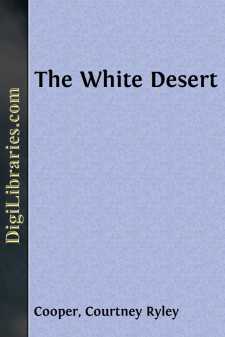Categories
- Antiques & Collectibles 13
- Architecture 36
- Art 48
- Bibles 22
- Biography & Autobiography 813
- Body, Mind & Spirit 142
- Business & Economics 28
- Children's Books 17
- Children's Fiction 14
- Computers 4
- Cooking 94
- Crafts & Hobbies 4
- Drama 346
- Education 46
- Family & Relationships 57
- Fiction 11829
- Games 19
- Gardening 17
- Health & Fitness 34
- History 1377
- House & Home 1
- Humor 147
- Juvenile Fiction 1873
- Juvenile Nonfiction 202
- Language Arts & Disciplines 88
- Law 16
- Literary Collections 686
- Literary Criticism 179
- Mathematics 13
- Medical 41
- Music 40
- Nature 179
- Non-Classifiable 1768
- Performing Arts 7
- Periodicals 1453
- Philosophy 64
- Photography 2
- Poetry 896
- Political Science 203
- Psychology 42
- Reference 154
- Religion 513
- Science 126
- Self-Help 84
- Social Science 81
- Sports & Recreation 34
- Study Aids 3
- Technology & Engineering 59
- Transportation 23
- Travel 463
- True Crime 29
The White Desert
Description:
Excerpt
THE WHITE DESERT
CHAPTER I
It was early afternoon. Near by, the smaller hills shimmered in the radiant warmth of late spring, the brownness of their foliage and boulders merging gradually upward to the green of the spruces and pines of the higher mountains, which in turn gave way before the somber blacks and whites of the main range, where yet the snow lingered from the clutch of winter, where the streams ran brown with the down-flow of the continental divide, where every cluster of mountain foliage sheltered a mound of white, in jealous conflict with the sun. The mountains are tenacious of their vicious traits; they cling to the snow and cold and ice long after the seasons have denoted a time of warmth and summer's splendor; the columbine often blooms beside a ten-foot drift.
But down in the hollow which shielded the scrambling little town of Dominion, the air was warm and lazy with the friendliness of May. Far off, along the course of the tumbling stream, turbulently striving to care for far more than its share of the melt-water of the hills, a jaybird called raucously as though in an effort to drown the sweeter, softer notes of a robin nesting in the new-green of a quaking aspen. At the hitching post before the one tiny store, an old horse nodded and blinked,—as did the sprawled figure beside the ramshackle motor-filling station, just opened after the snow-bound months of winter. Then five minutes of absolute peace ensued, except for the buzzing of an investigative bottle-fly before the figure shuffled, stretched, and raising his head, looked down the road. From the distance had come the whirring sound of a motor, the forerunner of a possible customer. In the hills, an automobile speaks before it is seen.
Long moments of throbbing echoes; then the car appeared, a mile or so down the cañon, twisting along the rocky walls which rose sheer from the road, threading the innumerable bridges which spanned the little stream, at last to break forth into the open country and roar on toward Dominion. The drowsy gasoline tender rose. A moment more and a long, sleek, yellow racer had come to a stop beside the gas tank, chortled with greater reverberation than ever as the throttle was thrown open, then wheezed into silence with the cutting off of the ignition. A young man rose from his almost flat position in the low-slung driver's seat and crawling over the side, stretched himself, meanwhile staring upward toward the glaring white of Mount Taluchen, the highest peak of the continental backbone, frowning in the coldness of snows that never departed. The villager moved closer.
"Gas?"
"Yep." The young man stretched again. "Fill up the tank—and better give me half a gallon of oil."
Then he turned away once more, to stare again at the great, tumbled stretches of granite, the long spaces of green-black pines, showing in the distance like so many upright fronds of some strange, mossy fern; at the blank spaces, where cold stone and shifting shale had made jagged marks of bareness in the masses of evergreen, then on to the last gnarled bulwarks of foliage, struggling bravely, almost desperately, to hold on to life where life was impossible, the dividing line, as sharp as a knife-thrust, between the region where trees may grow and snows may hide beneath their protecting boughs and the desolate, barren, rocky, forbidding waste of "timber line."
Young he was, almost boyish; yet counterbalancing this was a seriousness of expression that almost approached somberness as he stood waiting until his machine should be made ready for the continuance of his journey....



